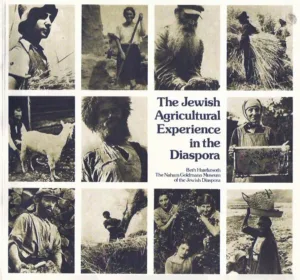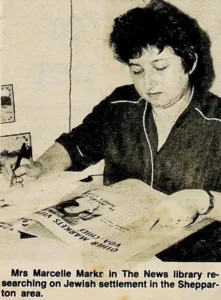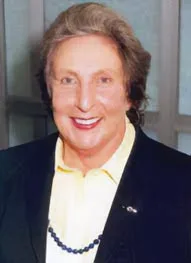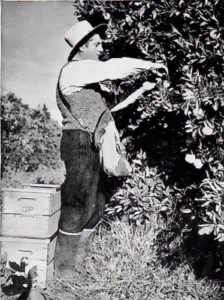Meet Ava McConnell - AJHS Intern 2023
Archiving is a funny thing. The process of sifting through material, of categorising and documenting a person’s life in paper paraphernalia, or the minutes and documents of an organisation, is at once an intimately connected and deeply solitary pursuit. In the case of the Marcelle Marks collection, it is 128 files that amount to her life’s work: the ‘Jews on the Land’ project, which aimed to document the experiences and lives of Jewish farmers in the twentieth century.
As an intern, my role is to comb through a collection and describe the contents, including which documents are in which files are in which box, so that future researchers have access to the wealth of knowledge she collected throughout her life. I’m conducting the placement as part of a Master of Museum and Heritage Studies degree at the University of Sydney, and it’s my first experience working in an archive.
What I’ve found so far is that there is a certain isolation inherent in archival work, but after all these days spent reading Marcelle’s writing – I like to think we’re on a first-name basis now – I’ve become attached to this collection, and to the glimpses of the woman whose life’s work I am reading.
 Marcelle began the ‘Jews on the Land’ research project at the invitation of Beth Hatefutsoth and the Museum of the Jewish Diaspora in Tel Aviv, Israel, and Louise Rosenberg of the Australian Jewish Historical Society in Sydney. She was assisted by Beverley Davis of the Victorian branch of the AJHS, and the results of the research were included in the 1983 exhibition, ‘The Jewish Agricultural Experience in the Diaspora‘, held at the Museum of the Jewish Diaspora. Her research spanned Jewish farmers across Queensland, New South Wales, Victoria, the Australian Capital Territory, and Western Australia, between the 1850s and the early 2000s. Her research culminated in the article ‘Jews on the Land: Mutual Farms and Mooringa‘, published in the Australian Jewish Historical Society Journal in 2019; however, her research covers significantly more than what is included in the article.
Marcelle began the ‘Jews on the Land’ research project at the invitation of Beth Hatefutsoth and the Museum of the Jewish Diaspora in Tel Aviv, Israel, and Louise Rosenberg of the Australian Jewish Historical Society in Sydney. She was assisted by Beverley Davis of the Victorian branch of the AJHS, and the results of the research were included in the 1983 exhibition, ‘The Jewish Agricultural Experience in the Diaspora‘, held at the Museum of the Jewish Diaspora. Her research spanned Jewish farmers across Queensland, New South Wales, Victoria, the Australian Capital Territory, and Western Australia, between the 1850s and the early 2000s. Her research culminated in the article ‘Jews on the Land: Mutual Farms and Mooringa‘, published in the Australian Jewish Historical Society Journal in 2019; however, her research covers significantly more than what is included in the article.
The material in the collection spans almost 170 years and includes interview recordings and transcripts, photographs, newspaper clippings, books and journal articles, maps, government documents, tourist brochures, letters, film negatives, cassette tapes, and more.
Marks’ collection particularly spotlights individual stories, centring the personal within the themes of war, migration, settlement, community, and development. She has collated information on several Jewish farming families and, in her article, she identifies the common threads – towns with high populations of Jewish farmers, organisations that helped Jewish migrants travel to Australia and enter the agricultural industry, and training centres such as Chelsea Park Farm.
Amongst these are objects and material that develop a sense of the personal nature of Marks’ collection, connecting the researcher to the research.

Marks has a lot of material dedicated to the Pearlman family; the earliest is a letter from Abraham Pearlman to the Russian Consul, dated September 4th 1916. Abraham explains that he has not had any recent correspondence from his brother living in Russia, suggesting it might be because the letters are in Hebrew and the Russian censors are unable to translate them and thus suspicious of their contents. He asks for help delivering a letter and some money to his brother in Russia, as the men in his brother’s family are away fighting in Poland.
Equally personal is a poem, written for the fortieth wedding anniversary of Mark Pearlman, who was Abraham’s son, and Mark’s wife Minnie – Jewish farmers who lived on the land in the early-to-mid twentieth century. Cassette tape interviews reveal Mark lived on the land from 1905 and Minnie joined him when they married in 1936; they stayed on their farm, Herzlton in Boggabri, north-eastern New South Wales, until they retired to Sydney in 1965. Mark attended Fort Street High School – my own alma mater – in 1910 with his sister Eva, before returning to the farm for the remainder of his schooling. Of his siblings, only he and his youngest brother Hymie took up farming, and Marcelle Marks writes that “to become a good farmer was his aim in life”.

A collection of black and white photographs tucked into plastic sleeves offers lovely insights into their life ‘on the land’. Mark, sitting on a horse with his two young children Mahla and Braham; a young Mahla standing proudly with a pony behind her. Other photographs capture daily farm life, with various guests and family friends captured. Also contained in the collection is a piece of Mahla’s schoolwork from the Correspondence School in Blackfriars, dutifully recording her age as 5 ½. It’s accompanied by newspaper clippings celebrating Mahla Pearlman’s extensive legal career, including becoming the first woman president of the Law Society of NSW.
The Pearlman family is just one of the families Marcelle Marks has researched, though the depth and variety of material available means it is one of the most complete and intriguing. This is perhaps because of Marcelle’s personal connection to the Pearlman family – the expansive family tree reveals that Mark Pearlman is Marcelle’s uncle. The cassette-taped conversation between Marcelle, Mark, and Minnie, recorded in 1982, is a delightful trip down memory lane. Listening to it is like sitting on the couch as your family reminisces – Mahla pops in and out and children chatter in the background. Their disagreements over the details, the light bickering over how long, how far, or how high things were, and Marcelle’s own gentle interviewing style, add a delightfully human element.
My favourite part – though I’m sure revealing I have a favourite shows a lack of ‘archival professionalism’ – is the disagreement over the details of a court case regarding land ownership and permission to farm at ‘the Knob’. Amongst almost unintelligible voices, each offering their own account, Marcelle’s voice rings out:
“I shouldn’t use it if we’re not sure! It sounded a good story…
well yes, we need stories, but we need ones that are true!”
It’s a delightful chastisement… a gentle prodding for the truth that she displays in each of her taped interviews.

I also think this conversation reminds listeners of the nature of the research project: despite the breadth of research material, the endless correspondence, and official-looking documents, “Jews on the Land” was a passion project, borne of Marcelle Marks’ commitment to documenting the experience of rural Jewish communities with diligence and dedication.
This has been quite the experience for me – part practical instruction in archival practice, part crash course in new (or old) technology. I listened to my first cassette tape and handled my first floppy disc – although the disc was corrupted and the data unreachable. I’ve been told that’s a common experience, especially with ones from the 1980s, and am trying not to take it personally!
These new experiences with old technology serve to remind us of the fragility of information, and how its continued existence requires care and expertise. Marcelle’s collection – the decades of research and information – is here in the archives because of the dedication of the staff at the AJHS, particularly Sabrina. To look through it is to gain a sense of Jewish rural life, of people like Mark and Minnie Pearlman, but it is also to get a sense of Marcelle herself, and the wonderful connections she built across states and decades.
Access the Marcelle Marks collection
Become a Volunteer with AJHS
Societies like AJHS rely on volunteers to be able to function. Whether you have retired or are just starting out on your professional journey, consider volunteering your time and expertise to help preserve our community's heritage and help others discover their own family story. Click the heading to email AJHS for more details.
